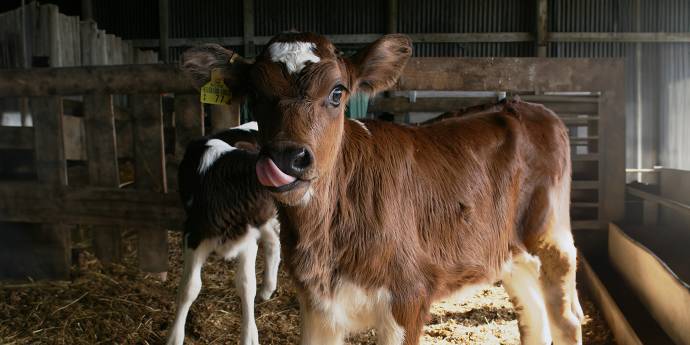Moving with the times
Dairy farmers are embracing technology to increase productivity and improve sustainability.

Dairy New Zealand chair Jim van der Poel CMInstD says technology is helping the sector evolve, changing production processes which have contributed to its growth and sustainability.
Menial tasks have been stripped out, creating bigger and more efficient operations and operators.
“Technology is there partly for productivity, partly for sustainability and ease of management. It helps farmers manage their businesses better, which is important as there are a lot of risks in operating a farm,” says Van der Poel, an experienced governor who has been in the dairy industry for nearly 45 years.
Poel is able to track his cows and find specific details about their lineage and health status, with an app measuring their activity, rumen and information around calving – all connected via a neck collar recording systems that link to his mobile.
“That’s at our fingertips, so that technology is evolving all the time,” says Van der Poel, adding that it makes farmers’ roles and lives a lot more interesting.
The dairy industry plays a huge part in New Zealand’s economic wellbeing, generating about 25 per cent of all export earnings. In the year to April 2023, the sector generated nearly $26 billion in export revenue.
“It is competitive and one of the most regulated industries in New Zealand, but it’s also competing in one of the most protected markets in the world,” Poel says.
But with New Zealand’s ageing and urbanising population, future-proofing the sector and increasing productivity presents a real challenge.
A changing demographic and urban migration means a smaller talent pool. “Immigration has always played a part, my heritage is testament to that,” says Poel, whose parents migrated to New Zealand from the Netherlands and started their new lives as farmers.
Migrant workers come from places such as the Philippines, India and Fiji, and Van der Poel says they make up a regional portion of the population that are now part of dairy farming communities and operations.
“Some people come with a bit of experience because it makes it easier to get into the country, but they will have worked in places like Saudi Arabia where it’s a very different system.”
“We try to understand the issues we have, own them as an industry and find the solution. We collaborate with our central and local government and our communities to solve the issues and walk through them. ”
A new regulatory environment implemented during Covid-19, while stressful for the industry at the time, has played a big role in maintaining quality control and mitigating risks around modern slavery.
While there are always a few bad apples, Van der Poel says the industry has always been good at looking after its people, and the tightening of regulations from a business and governance perspective has strengthened the industry.
“We put all those systems and processes in place to make sure when migrants come here, they have good experiences, and the roles are what they’ve been promised. It does make a big difference.”
Dairy farmers have to constantly think about different ways to produce their products to ensure neither the quality, nor the reputation, is compromised. This includes ensuring dairy remains top-of- mind for consumers in New Zealand and abroad, investing in marketing, food service, and research and development around animal nutrients.
Van der Poel understands the world is changing with people making deliberate and conscious decisions about what they consume in line with their own values and health needs.
Being involved in oversight of the sector with first-hand knowledge of the structures and operations, Van der Poel says it is about helping to take the industry to the next level.
“We try to understand the issues we have, own them as an industry and find the solution. We collaborate with central and local government, and our communities, to solve the issues and walk through them.
“Where farmers are given the opportunity to do that, we always make more progress and it’s more enduring. For all the hurdles we have, and the international barriers and tight regulations, the industry has continued to thrive.”
Jim van der Poel CMInstD has also been on the board of the Fonterra Co-operative, Fonterra Shareholders Fund and New Zealand Co-operative Dairies.